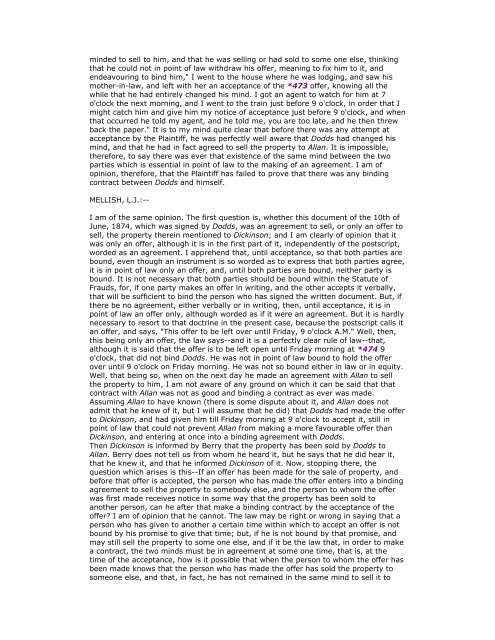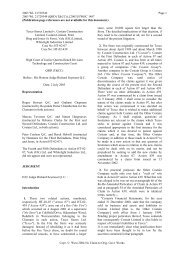Dickinson v Dodds - Thomson Reuters
Dickinson v Dodds - Thomson Reuters
Dickinson v Dodds - Thomson Reuters
Create successful ePaper yourself
Turn your PDF publications into a flip-book with our unique Google optimized e-Paper software.
minded to sell to him, and that he was selling or had sold to some one else, thinkingthat he could not in point of law withdraw his offer, meaning to fix him to it, andendeavouring to bind him," I went to the house where he was lodging, and saw hismother-in-law, and left with her an acceptance of the *473 offer, knowing all thewhile that he had entirely changed his mind. I got an agent to watch for him at 7o'clock the next morning, and I went to the train just before 9 o'clock, in order that Imight catch him and give him my notice of acceptance just before 9 o'clock, and whenthat occurred he told my agent, and he told me, you are too late, and he then threwback the paper." It is to my mind quite clear that before there was any attempt atacceptance by the Plaintiff, he was perfectly well aware that <strong>Dodds</strong> had changed hismind, and that he had in fact agreed to sell the property to Allan. It is impossible,therefore, to say there was ever that existence of the same mind between the twoparties which is essential in point of law to the making of an agreement. I am ofopinion, therefore, that the Plaintiff has failed to prove that there was any bindingcontract between <strong>Dodds</strong> and himself.MELLISH, L.J.:--I am of the same opinion. The first question is, whether this document of the 10th ofJune, 1874, which was signed by <strong>Dodds</strong>, was an agreement to sell, or only an offer tosell, the property therein mentioned to <strong>Dickinson</strong>; and I am clearly of opinion that itwas only an offer, although it is in the first part of it, independently of the postscript,worded as an agreement. I apprehend that, until acceptance, so that both parties arebound, even though an instrument is so worded as to express that both parties agree,it is in point of law only an offer, and, until both parties are bound, neither party isbound. It is not necessary that both parties should be bound within the Statute ofFrauds, for, if one party makes an offer in writing, and the other accepts it verbally,that will be sufficient to bind the person who has signed the written document. But, ifthere be no agreement, either verbally or in writing, then, until acceptance, it is inpoint of law an offer only, although worded as if it were an agreement. But it is hardlynecessary to resort to that doctrine in the present case, because the postscript calls itan offer, and says, "This offer to be left over until Friday, 9 o'clock A.M." Well, then,this being only an offer, the law says--and it is a perfectly clear rule of law--that,although it is said that the offer is to be left open until Friday morning at *474 9o'clock, that did not bind <strong>Dodds</strong>. He was not in point of law bound to hold the offerover until 9 o'clock on Friday morning. He was not so bound either in law or in equity.Well, that being so, when on the next day he made an agreement with Allan to sellthe property to him, I am not aware of any ground on which it can be said that thatcontract with Allan was not as good and binding a contract as ever was made.Assuming Allan to have known (there is some dispute about it, and Allan does notadmit that he knew of it, but I will assume that he did) that <strong>Dodds</strong> had made the offerto <strong>Dickinson</strong>, and had given him till Friday morning at 9 o'clock to accept it, still inpoint of law that could not prevent Allan from making a more favourable offer than<strong>Dickinson</strong>, and entering at once into a binding agreement with <strong>Dodds</strong>.Then <strong>Dickinson</strong> is informed by Berry that the property has been sold by <strong>Dodds</strong> toAllan. Berry does not tell us from whom he heard it, but he says that he did hear it,that he knew it, and that he informed <strong>Dickinson</strong> of it. Now, stopping there, thequestion which arises is this--If an offer has been made for the sale of property, andbefore that offer is accepted, the person who has made the offer enters into a bindingagreement to sell the property to somebody else, and the person to whom the offerwas first made receives notice in some way that the property has been sold toanother person, can he after that make a binding contract by the acceptance of theoffer? I am of opinion that he cannot. The law may be right or wrong in saying that aperson who has given to another a certain time within which to accept an offer is notbound by his promise to give that time; but, if he is not bound by that promise, andmay still sell the property to some one else, and if it be the law that, in order to makea contract, the two minds must be in agreement at some one time, that is, at thetime of the acceptance, how is it possible that when the person to whom the offer hasbeen made knows that the person who has made the offer has sold the property tosomeone else, and that, in fact, he has not remained in the same mind to sell it to
















